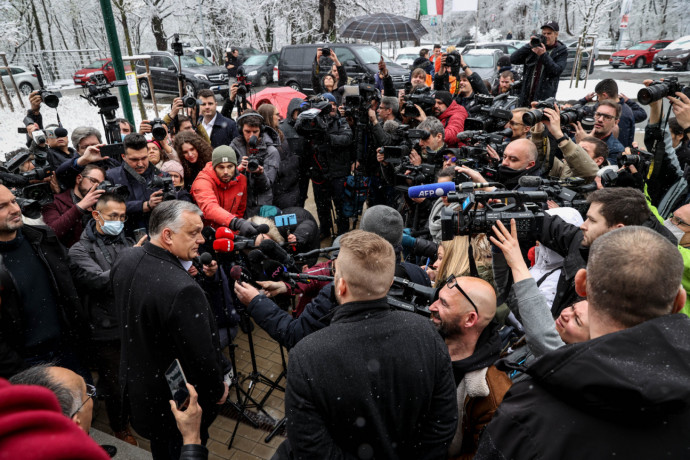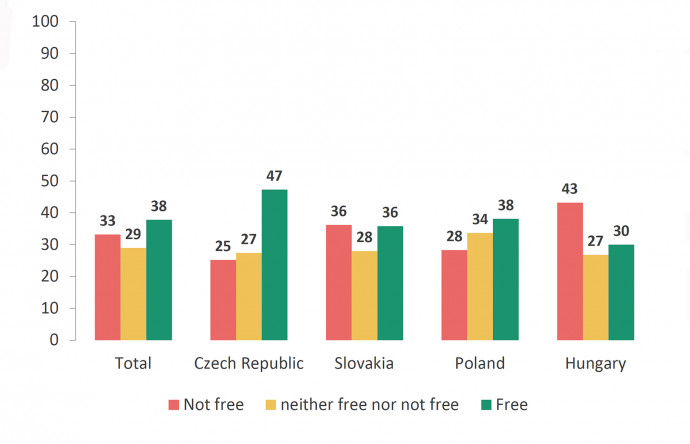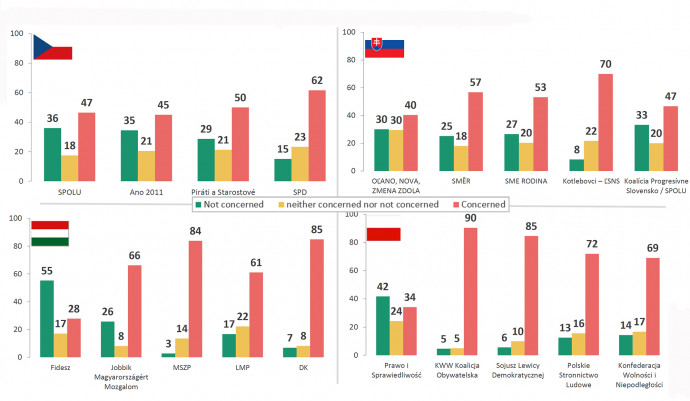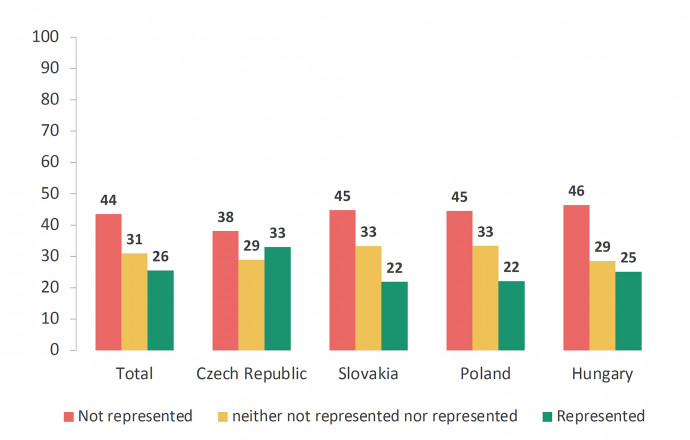7 percent of Hungarians say there is no need for independent press, and more than half of Fidesz' voters consider the press in Hungary free

The results of the survey entitled "Attitudes to media freedom and independence in Central Europe" were officially presented in Prague today. Telex is among those attending, and here is a brief summary of the results.
According to the majority of Hungarians, there is no press freedom in Hungary today, and the situation has gotten worse in recent years – although Fidesz-voters see these things somewhat differently – a survey made by the Czech media company Economia in the V4 countries has found.
The survey aimed to find out how much people support or worry for media freedom and independent journalism in Hungary, Slovakia, Poland and the Czech Republic, i.e. “in the countries where illiberalism is on the rise, and democratic liberalism in decline”.
However, the survey also discovered that support for press freedom and independent media is not evenly distributed among the V4 countries. While opinions about press freedom in the Czech Republic, Poland and Slovakia are quite similar, the survey found that there is significantly less support for editorial and journalistic freedom and independence, as well as the independence of the public media service in Hungary.
The Czech research institute Median surveyed a total of more than four thousand people in a nationally representative, online and phone survey between 1-17 February, with just over a thousand respondents per country.
The results show that among the V4 countries, it is in Hungary that most people perceive there is no press freedom, while this percentage is the lowest in the Czech Republic. 43% of the Hungarian respondents said that the press is not free in their country, because the government interferes in the journalists’ work.

The chart above shows the perception of media freedom from the state/government.
It is interesting that the older someone is, the more critical they are of the state of press freedom in the region: 39% of those older than 65 said that the press is not free, while only 23 % of those between 18-24 years of age said the same.
The survey looked separately at the opinions of Fidesz voters, more than half (58%) of whom said that there is press freedom in Hungary, with only 15% being of the opinion that this is not the case. The supporters of Poland’s governing party have a more or less similar opinion of the state of their press, while the supporters of the biggest Czech party, Andrej Babiš’s ANO 2011 have a more nuanced view of the situation in their country: 39% said there is press freedom in the Czech Republic, while 33% said there isn’t.
All four countries’ respondents agree that the state of press freedom in their countries has deteriorated in the last five years, while 55% of the Polish, and 40% of the Hungarian respondents are of the opinion that the situation in their country is worse than in other Central and Eastern European countries.
Except for Fidesz voters: when they were the only ones asked, 40% said that the situation has even gotten better in recent years, and only 19% considers the situation worse than it was before.
The survey also showed that 48% of Hungarians are worried about the state of press freedom. This number matches the answer given by the Czech and Slovak respondents, but it is much higher in Poland: 63% of people in Poland worry because of the situation there.
The answers were also analysed according to party preference, which brought interesting results: more than half of the Fidesz supporters are not worried about the state of the press in Hungary at all, while a sweeping majority of the opposition’s voters are very worried. This is not specific to Hungary, the other V4 countries are also showing a similar trend: the pro-government voters are the least worried, and the supporters of the opposition tend to be more concerned.

The chart above shows how worried each party’s supporters are about press freedom. Green=not concerned, red=concerned, yellow=neither
The survey also checked how important the existence of independent media – one that the government is unable to influence or censor – is according to the citizens of each country. Although 72 per cent of Hungarians say this is needed, this number is still lower than in the other three countries, where it was above 80 per cent. But it is also interesting to note, that
7 percent of Hungarians said that there is no need for independent press.
The voters of Fidesz and Jobbik have a shared opinion on this: 5% of both parties’ voters said that having an independent press in Hungary is not important. And while 3% of MSZP (Hungarian Socialist Party) voters agreed with this, not one DK (Democratic Coalition) or LMP (Politics Can Be Different) voter said the same.
Although the surveyed in all four countries think that the owners of media outlets should not be allowed to tell journalists what to write, the percentage of those with this opinion is much lower in Hungary than in the other V4 countries: only 47% compared to the 60% in Slovakia, the Czech Republic and Poland. Another difference is that only 55% of Hungarians believe that editorials should have complete autonomy regarding what and how they write, while in the other 3 countries this number is well above 70%.
Hungary is also lagging behind in regards to what we think about the relationship between the government and the public media service.
Although 53% of Hungarians agree that the government should not be allowed to interfere in the operation and programming of the public media service, this is far behind the other countries in the region: for example, in the Czech Republic, this number is around 80%.
And while the vast majority of the Hungarian opposition’s voters declared that the government should have nothing to do with the operation of the public media service, Fidesz voters could not all agree on this: 35% of them answered this question with a “yes”, and 35% with a “no”.
The survey also made it clear that according to 46% of Hungarians, the public media service does represent or show their political views, while only 25% claim that it does. This however, is not specific to Hungary: the situation is the same in Slovakia and Poland.
The graph below shows the extent to which respondents in each country perceive their political positions to be presented and represented by public media.

But what do the V4 countries think about what can be done to protect press freedom and to support independent journalism? In each country, roughly the same percentage of people support the idea of the state strengthening the laws ensuring press freedom and independence. Less respondents see the solution in the government supporting the press by lowering their taxes: only 38% of Hungarians would support this, and the number is about the same in Slovakia and the Czech Republic, with Poland being the only one with 49% on this.
The number of those supporting the idea of the EU imposing penalties and sanctions on the countries where the government is obstructing freedom of the press is lowest in Hungary: 52%. In the other three countries this number is between 58% and 63%.
The survey showed that those who get their news from news websites are more likely to consider press freedom important, and in both Hungary and Poland, those who read the printed press have a less positive attitude towards journalistic independence and freedom of the press.
For thirty years now, Viktor Orbán and his longest serving fellow politicians have had the basic premise that the press is against them, and the journalists are always working to help Fidesz’ opponents. Based on this framework, if Fidesz loses, then they were outnumbered by the media, but if they win, it could have only happened in spite of the media working against them.
The party’s attitude towards the press was not always like this. In this video, we showed how the ruling party took over the free media outlets in Hungary within just a few years, and based on reports from employees working there, we wrote about the way the Hungarian News Agency (MTI) functions nowadays.
If you enjoyed this article, and want to stay informed about important events related to Hungary, subscribe to the Telex English newsletter!